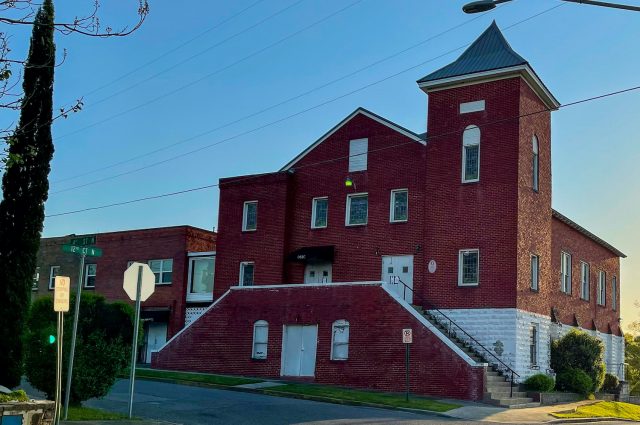
Alabama News Center
The Alabama Historical Commission has awarded Birmingham’s Old Sardis Baptist Church a $192,000 grant to aid in preserving a site where one of the most important moments in the city’s Civil Rights story took place.
In 1956, Birmingham Civil Rights pioneer, the Rev. Fred Shuttlesworth; Rev. Robert Alford, then pastor at Old Sardis; and other ministers and civil rights activists gathered at the church to organize the Alabama Christian Movement for Human Rights (ACMHR), which played a pivotal role in the long struggle to break the back of official racial segregation in the city.
The ACMHR was formed after the NAACP, the nation’s oldest civil rights organization, was banned from operating in Alabama by a state court. According to the Encyclopedia of Alabama, then state Attorney General John Patterson sued to shut down the NAACP, alleging the organization wasn’t eligible to do business in Alabama.
The church is located in the Enon Ridge community, also known as “Dynamite Hill” because of the frequency of racially motivated bombings targeting Black families in the 1960s. Because of its significance, Old Sardis is already a part of the Alabama African-American Civil Rights Historic Sites Consortium.
The historical commission grant will help support enhancements to the church building, “bringing tangible, restorative impact to the community and preserving Alabama’s history,” church officials said in a news release.
On June 1, 1956, the same day the court injunction against the NAACP was issued, Shuttlesworth, then pastor of Birmingham’s Bethel Baptist Church and an NAACP member, met with other Black ministers and activists at Old Sardis and agreed to create the ACMHR, in advance of a mass community meeting scheduled for June 5.
The ACMHR “chose its name very deliberately,” the Encyclopedia of Alabama explained. “Shuttlesworth reasoned that city officials could outlaw an organization but could not outlaw a movement. Including ‘Christian’ in the title would distinguish it from communist and other supposedly subversive groups while giving it a foundation and Christian orientation.”
Shuttlesworth also underscored the need to use the term “human rights” as more inclusive than civil rights. Alford, in turn, recommended that “Alabama” be included, anticipating the group’s impact would extend beyond the city.
As many as 1,000 people attended the June 5 meeting at Sardis Baptist, the Encyclopedia of Alabama said. Shuttlesworth was elected ACMHR president. The group was formally incorporated in August 1956.
“Each Monday night thereafter, Shuttlesworth led mass meetings to provide information and inspiration for other interested parties,” the Encyclopedia of Alabama recorded. Hundreds of people routinely attended the gatherings, held at different churches around the city and supported the group with donations. In 1959 the organization had roughly 1,000 members, 60% of whom were women.
With the demise of the NAACP in Alabama, ACMHR took up the mantle of demanding the end to segregation in Birmingham and began conducting protests in addition to holding mass meetings. In 1958, members challenged segregated seating on city buses, which led to the arrest of 13 riders, including Shuttlesworth. That same year, ACMHR petitioned the city to desegregate its parks and recreation centers. Rather than comply with federal court orders to integrate, the city closed down the facilities.
ACMHR also provided nonviolent, civil disobedience training to Black students at Miles College in Fairfield. The students went on to hold sit-ins at Birmingham’s whites-only department store lunch counters and launched an economic boycott against segregated retail establishments. ACMHR aided the “Freedom Riders” when they came through the city in 1961 and met with violent resistance to their efforts to integrate interstate buses and terminals in the South.
It was Shuttlesworth and ACMHR leadership who ultimately persuaded the Rev. Martin Luther King Jr. to bring the Southern Christian Leadership Conference to Birmingham in 1963 to launch the joint campaign to end official segregation in the city.
“The narrative of Old Sardis Baptist Church and its role in the movement had been lost in Birmingham’s civil rights memory,” church officials said in the news release announcing the historical commission grant.
Adrienne Reynolds, with the Old Sardis Baptist Church Historical Committee, said she hopes the grant award “reminds the world of the impact of Old Sardis Baptist Church on the world.”




